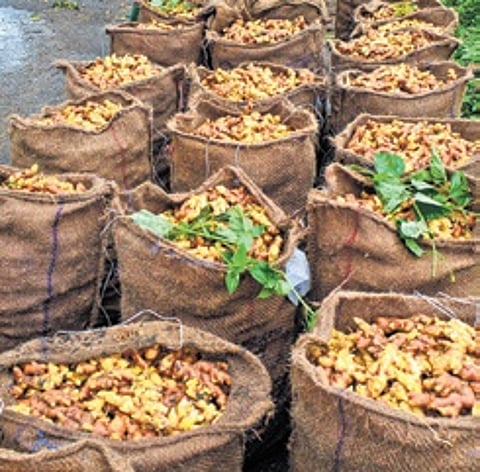

HUBBALLI/HAVERI: Ginger cultivation that has rendered thousands of acres in Chamarajanagar, Mysuru, Chikkamagaluru and Hassan districts infertile is luring farmers of Dharwad and Haveri districts, thanks to lucrative offers by Kerala-based cultivators.
Farmers in North Karnataka districts who have had problems because of rising cost of agriculture and losses due to heavy rain last year, are opting to lease out their land to ginger cultivators from Kerala. They are happy that each acre of land gets Rs 1.15-1.18 lakh for an 18-month lease. Now, villagers are queuing up to sign leases with ginger farmers.
Basavaraj Konnur, a farmer who has leased his three-acre land to a ginger cultivator at Rs 1 lakh per acre, said, “We spent nearly Rs 30,000 per acre to cultivate maize last year. Normally, we reaped 20 quintal per acre, but this time we got just 5 quintals.”
Basavraj Mundinamani, another farmer, said this year, they lost money in cultivating maize because of heavy rainfall. He was approached by a man from Kerala offering Rs 1.15 lakh per acre. As he has not been able to farm this year because of the loss, he gave away his land on lease. “All I know is his name is Ajay and the lease is for 18 months. I don’t know which part of Kerala he is from or what happens to the land if ginger is cultivated,” he said.
“Many have entered into such agreements. I need the money badly and got it in advance. Their only condition is that there should be a borewell. I got the borewell drilled at Rs 2.14 lakh. I will now earn not less than Rs 6.5 lakh,” he said.
‘Ginger long-term crop, requires more water’
Basappa Horapete from Thimmapur village near Hubballi is another farmer who has leased out his 16-acre property.
“I lost at least Rs 5,000 per acre last year. People from Kerala were after me for the last two years. As I could not make up the loss last year, I am leasing out my land,” he said.
Lease holders cultivate at least 40 bags of ginger weighing 60 kg each in one acre. They apply around 50 bags of chicken manure per acre and use a lot of chemical fertiliser and pesticides as ginger is prone to leaf disease.
Farms with borewells are offered higher amounts and if there is no borewell, the lease holder digs it and deducts the amount from the lease money. “We spend Rs 6 lakh per acre in cultivating ginger. We expect Rs 1,600 per bag weighing 60 kg and if we get Rs 2,100 per bag, it is a big profit,” said a lease holder on condition of anonymity.
Thousands of acres have been given on contract in Mundgod taluk in Uttara Kannada, Kalghatgi in Dharwad taluk, Hangal in Haveri taluk and Kadalli, Nittur, Thimmapura, Neeralga, Teertha, Adavi Somapura, Jigalli, Malali, Hirebendigeri, Madli, Honnapura and other villages on the outskirts of Hubballi.
Some agriculture experts expressed their concern, saying farm land will be rendered useless, while a few said ginger cultivation enriches soil and helps farmers. “We have seen what ginger cultivation has done in Chikkamagaluru, Hassan, Kodagu and other districts. No doubt, it brings money to farmers, but it does not help them economically. It is exploitation and also leads to contamination of water, apart from making the land useless,” said Krishna Prasad, director, Sahaja Samrudha.
Hittalmani, former additional director, Horticulture Department, said soil gets affected due to constant application of macro and micronutrients and pesticides. “It is a long-term crop that requires more water and care. Usage of macro and micro nutrients and pesticide is high. The crop affects the soil,” he said.
A senior scientist from Horticulture Department, UAS, Dharwad, who has done an eight-year study on ginger cultivation, said, “Our study found that soil nutrients are enriched after ginger cultivation because these cultivators use a lot of nutrition and farmyard manure. Farmers cultivating maize after ginger are getting a good yield. Our study found that though farmers do not apply nutrients, their
yield shows improvement. The only setback is that chemical residues remain in the soil and as a lot of water is used, nearby streams and water bodies get contaminated,” he said, requesting anonymity.